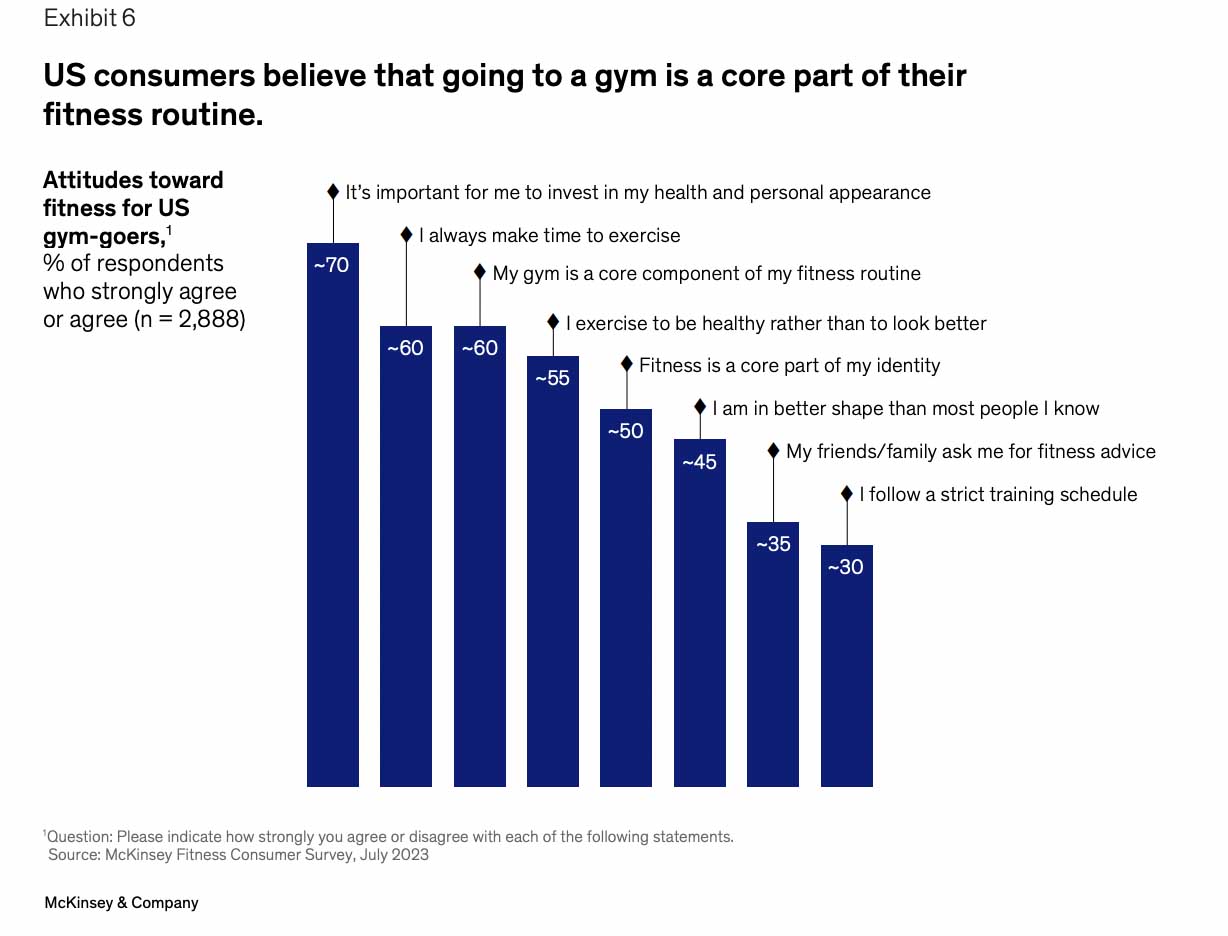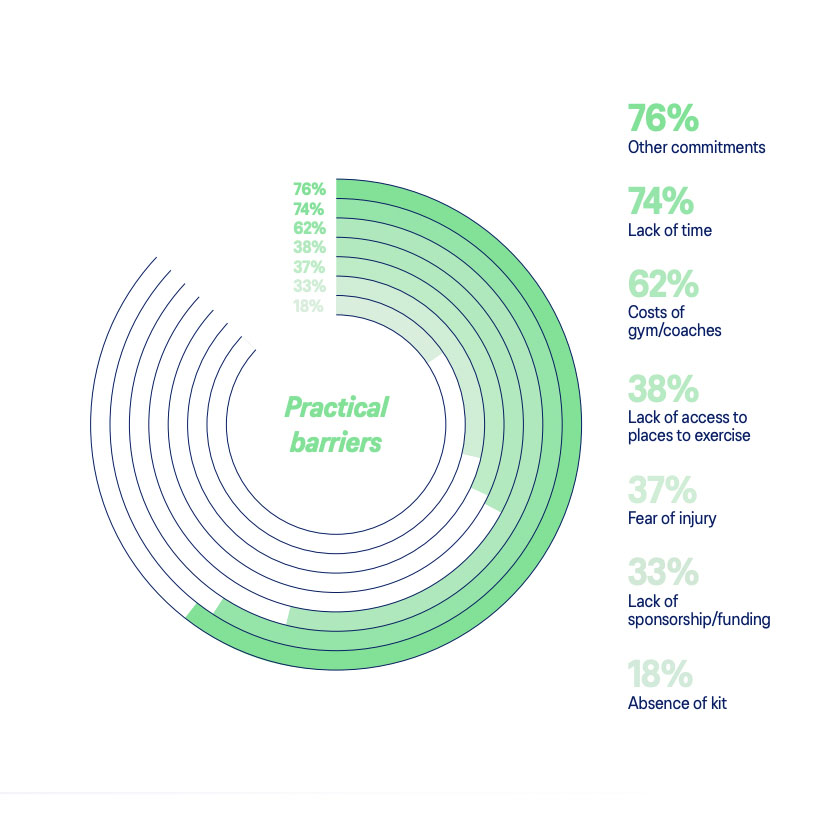
1. IN-PERSON FITNESS SPENDING SET FOR GROWTH
McKinsey’s 2024 Future of Wellness survey analyzes how consumers across the US, UK and China are spending their money in the booming wellness category. With 58% of US respondents prioritizing wellness more now than they did a year ago, the research identifies women’s health, weight management, and in-person fitness as areas primed for growth. The survey also found Millennials and Gen Z spend more on health and fitness than older consumers. Across all US consumers, seeing the product for themselves was listed as the biggest influence on purchasing decisions, followed by recommendations from family and friends.
Across all ages, McKinsey found 50% of US gymgoers believe fitness is now ‘a core part of their identity’. Meanwhile, in-person fitness classes and personal training were the top two areas where consumers expected to spend more on fitness, highlighting demand for in-person experiences that drive motivation and accountability.

Operators who can act on this are primed to win the new exerciser in search of guidance, as well as the experienced member looking to diversify their in-club activities. Club open days and events represent a prime opportunity to attract fresh faces into the facility, especially when members are encouraged and incentivized to bring along their friends and family.
2. STRENGTH IN NUMBERS
As strength training continues to gain traction, MindBody finds that those taking part in strength workouts are among the most frequent exercisers. Its 2024 predictions report notes more than 60% of consumers incorporate strength training into their routine, with over half who do so working out 2-4 times per week.
With strength training areas already crowded in many clubs, should operators who are unable to increase capacity instead focus on driving traffic to other areas of their facilities? Retention expert Dr Paul Bedford thinks so, suggesting capacity insights are the cornerstone of a successful member acquisition strategy.
“If you know you’ll struggle to service more members using your strength equipment (and you’ve done everything you can to maximize capacity) then you’re better off targeting prospects who will predominantly use the areas of the club – like the functional areas, the group exercise studio – where you still have capacity to fill,” notes Dr Bedford.
“You’re in a better position to meet the needs of these prospects, so they’ll likely stay longer and yield a longer lifetime value, representing a better RoI for your marketing dollars.”
3. HYPERTROPHY HIGH ON THE AGENDA
US club chain Life Time’s 2024 Health and wellness survey suggests strength and wellness remains top of mind for US consumers. For those currently working out, building muscle is top of the agenda: 36% of respondents said it was their number one goal – an increase of 3% from the previous year.
Nearly two-thirds of respondents (64%) said they’d prioritize their health and wellbeing more in 2024 than in 2023 – a 29% increase. Their motivation? Being able to keep doing things they love for as long as possible. That’s not to say holistic reasons for exercising completely rule the roost: 36% of people said they’d give up social media forever in exchange for losing 10 pounds (4.5kg).
4. LOW-IMPACT TRAINING IS TRENDING
For all the talk of strength, Mindbody’s 2024 Predictions Report indicates low-impact workouts are on the rise. Pilates – in all its myriad forms – is enjoying a resurgence, fueled in part by strong social media advocacy. The average American fitness routine now consists of 40% low-impact exercise, and the Mindbody report confirms soaring appetite for gentle movement. Pilates was the most popular workout of the year in 2023 – with booking reservations for classes up 92% – while yoga and strength training followed closely behind. The ascent of low-impact movement (with bookings up 176% since 2022) suggests exercisers are seeking wellness and recovery-inspired training to offset high-impact activities.
5. CLUBS BUILD CASE FOR CREDIBILITY
The annual ACSM Fitness Trends report underscores the value operators place on credibility, with remuneration for qualified exercise professionals and employing certified exercise professionals both featuring in the top ten trends for 2024.
In an industry that finds itself increasingly in competition with unqualified social media influencers for consumers’ fitness dollars, the report suggests that operators are doubling down on rewarding professionals for the expertise and trust they bring to club members.
The ACSM report notes how operators are able to win trust by emphasizing the science and quality that underpins their offerings, gaining an advantage over unvalidated digital rivals and championing clubs as the go-to destination for safe, motivational workouts that deliver results.
6. FEMALE EXERCISERS STRUGGLING TO FIND TIME
The recent Asics report into the gender exercise gap found that women face multiple barriers to exercise, including lack of time (74%) and inability to fit training in around competing commitments (76%).

Based on responses from nearly 25,000 female exercisers globally, the report also noted 61% of women cited motherhood as a reason for dropping out of fitness. Supporting mothers and caregivers to return to exercise has proven to be extremely beneficial to post-natal health and an area where clubs can provide significant value. Academic research has shown postpartum mothers who engage in blended workouts of cardio, strength and core training in a club setting experience decreased levels of depression and anxiety.
READY TO UNLEASH YOUR NEXT GENERATION OF MEMBERS?
Les Mills has crafted a new series of programs to meet the specific demands of Gen Z and put your club in the fast-lane for growth.
DISCOVER MORE
